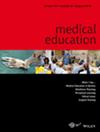Why we should view the decision of medical trainees to cheat as the product of a person-by-situation interaction
Abstract
Background
Cheating during medical training is a delicate subject matter with varying opinions on the prevalence, causes and gravity of cheating during training.
Proposed framework
In this article, the authors suggest that the decision to cheat is best viewed as the product of a person-by-situation interaction rather than indicating inherent dishonesty and/or extrinsic motivation in those who participate in cheating. This framework can explain why individuals who would typically default to honesty may participate in cheating if there is perceived justification for cheating and where situational variables, such as ease of cheating, rewards for cheating and perceived risk associated with cheating, make the decision to cheat appear rational.
Discussion
They discuss why the impression that there is a culture of cheating can provide perceived justification for medical trainees to cheat if they have the opportunity. They then describe how aspects of medical training and assessment may enable or hinder cheating by trainees. Consistent with the person-by-situation interaction framework, they contend that our response to cheating should include interventions directed at both the person who cheated and situational variables that enabled cheating. Recognising that some forms of cheating may be widespread, difficult to detect and contentious (such as the creation and use of exam reconstructs), their proposal for dealing with suspected and pervasive cheating is to identify and target enabling variables such that the decision to cheat becomes less rational. Their hope is that in so doing, we can gradually nudge trainees and the culture of medical training towards honesty.

 求助内容:
求助内容: 应助结果提醒方式:
应助结果提醒方式:


